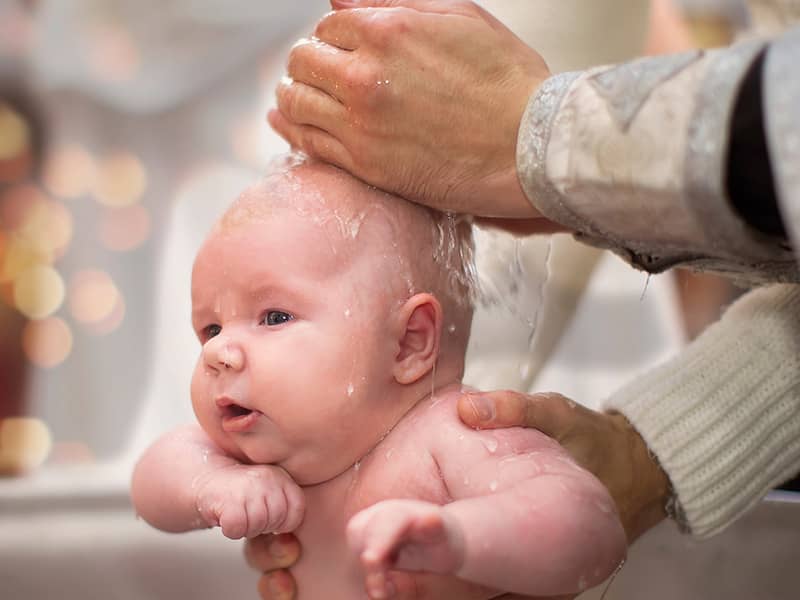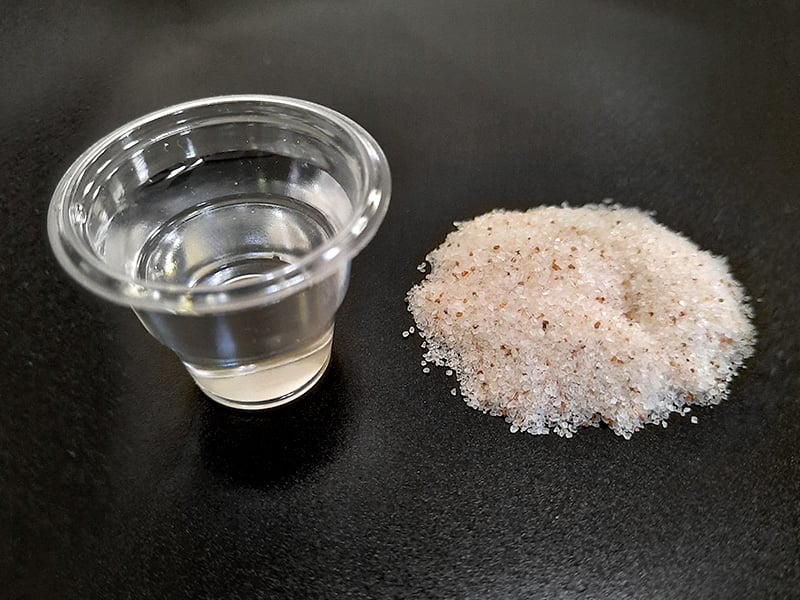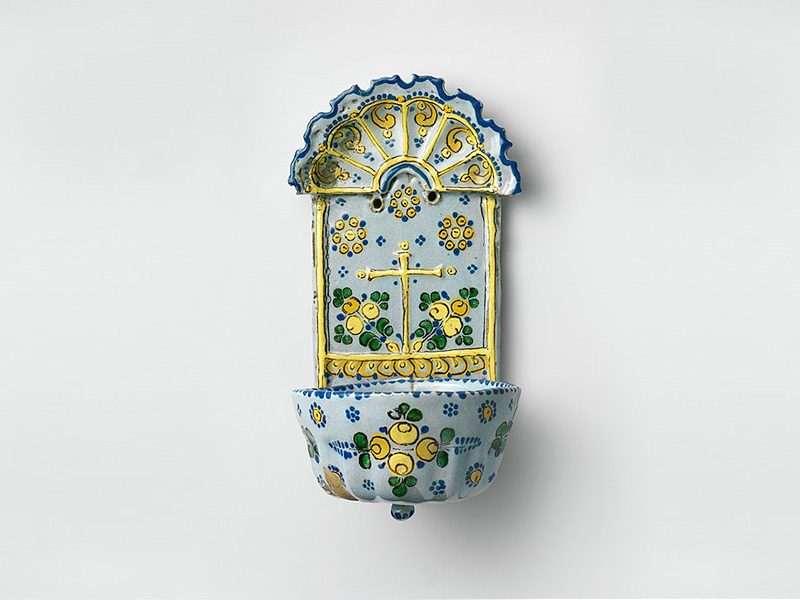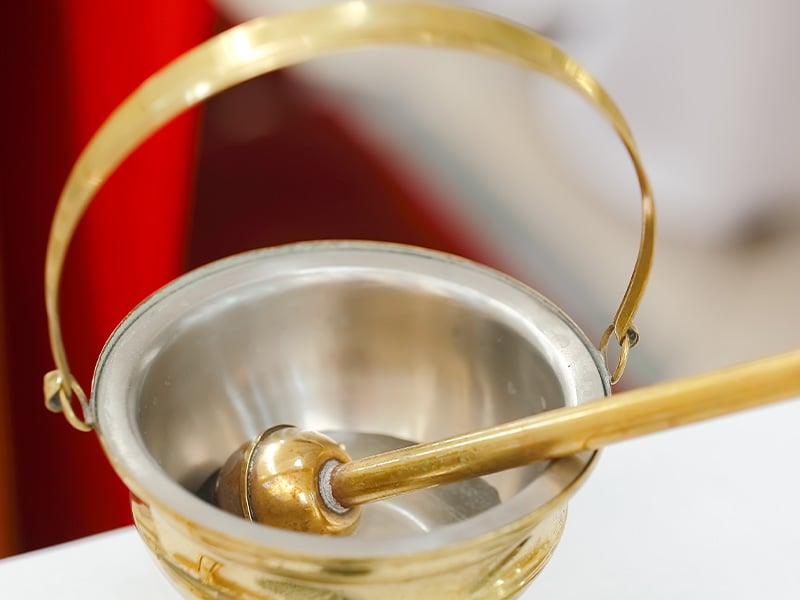How To Make Holy Water From The Bible
"Religion Behind the Scenes" spotlights the less discussed, merely no less crucial, tasks that go on religious communities running, and the people who brand information technology all happen.
H2o is a sacred symbol, common in the Holy Bible and in many denominations of Christianity. Among other things, water is oftentimes used as a symbol for spiritual cleansing (Ephesians v:26; Hebrews 10:22), the Holy Spirit (John 7:37-39), and fifty-fifty for God Himself (Jeremiah 2:13 & 17:xiii). In traditions, such as Roman Catholicism, Eastern Orthodoxy, Anglicanism, and some Lutheran synods, Holy Water is often utilized during the liturgy and in various sacraments—and with symbolic meanings akin to those mentioned.
Reared as an Episcopalian, Father Richard Tomlinson converted to Roman Catholicism after college, and currently serves equally Parochial Vicar at Prince of Peace Cosmic Church & School, in Taylors, S Carolina. Ordained to the priesthood in 2009, Father Tomlinson has not only made Holy Water, simply has quite literally used information technology daily in his ministry and life. In this installment of Religion Backside the Scenes, he tells us a scrap virtually how Holy H2o is made and how information technology is used in the Christian church.
Obviously, a lot of people who will read this interview are not going to be Roman Catholic. So, could you lot ascertain for u.s. what Holy Water is and how it's used in Roman Catholicism?
Well, Holy Water is water that has been blest past a priest, though other clergy (such equally a bishop) tin can bless it besides. The two main uses are for baptism and every bit a sacramental—in blessing something or in the liturgy itself. And, like whatever sacramental, information technology's ordered toward the sacrament, significant the presence of Christ Himself. And then, in baptism, for example, the water was blessed by Christ (in His baptism), and and then (through the priest) it is blessed again by Christ—and information technology takes away the stain of original sin or whatever other sins that have been committed. And then, the Holy Water has a cleansing power, which is really crucial to the understanding of baptism. Thus, information technology symbolizes our baptismal purity, and it also signifies the protection that comes from that. It represents the physical activity of being purged of original sin; and represents existence renewed and refreshed—likewise equally the ability to experience God's grace in a pure and unadulterated way.
Merely I think information technology's of import to realize that Holy H2o (in the Catholic tradition) is made by mixing blessed common salt with h2o, and the blessed salt is in that location for the purpose of exorcisms. Salt has a long history of being used equally a preservative, and also as a purifying agent. Specifically, salt mixed with water comes from 2d Kings chapter 2, where the prophet Elisha is in Jericho. And the water there is not healthy. And then, the people inquire him to practise something nigh it. And he says, "bring me some common salt" and he put salt in the water, so it becomes very sugariness and good to drink. He says, "I have healed these waters." So, in the approving of the salt (for the making of Holy H2o), that action of Elisha [2 Kings 2:19-22] is actually referred to. And and so, the Holy Water is a very powerful defence against evil spirits and evil thoughts within us. It brings us to that baptismal purity, and it besides gives us protection from spiritual evil.

Y'all mentioned that clergy other than a priest tin bless or make Holy H2o. What clergy are allowed to do that?
Well, in addition to priests, the bishop tin when making a special kind of Holy H2o known equally "Gregorian Water"—which was used in the old Pontifical for the consecration of an altar in a church. Gregorian H2o contains more than just blessed salt and water. It is as well mixed with wine and ashes. And so, it's a very, very powerful kind of Holy Water.
A deacon can bless Holy Water in the Novus Ordo. Merely he couldn't do the exorcisms, then he can't bless the salt—merely he tin mix the h2o and the blessed salt together and give a blessing.
Are at that place circumstances in which a Catholic might use Holy Water—other than baptisms, exorcisms, or equally a sacramental?
Well, in the traditional Latin Mass, the priest can practice a ceremony called the Asperges—where the congregation is sprinkled with Holy Water. It happens (in the Easter season) during the vidi aquam, where the choir sings a the retort while the priests sprinkles the people with Holy Water.
Then, my Greek Orthodox parents would bring Holy Water home from the church and use it. Are in that location circumstances in which it would be inappropriate to use Holy Water?
Well, of course, y'all shouldn't utilize it for any profane purpose, only information technology can exist used—especially in the Eastern tradition—in a diverseness of ways. I remember once, when I was in Jericho (in the Holy State), and I was visiting an Orthodox Church at Epiphany; and there were dozens of trays or plates of Holy Water that had been blessed and were beingness distributed to people who would have it home and drinkable it, utilise it in cooking, or whatsoever.
In the West, we have a vat of Holy H2o in the narthex, and people can come and take every bit much as they desire. We fill it up on a regular footing. Catholics use Holy Water at habitation, mostly for approval. So, for case, it's a tradition in the W to get effectually the house at night saying the St. Michael prayer and sprinkling Holy Water for protection from evil spirits, bad dreams, or whatever. Of course, for a Cosmic priest, you're using Holy Water in blessings all of the fourth dimension. So, you know, we merely had the approving of the animals on the feast of Saint Francis, for example. And I would become effectually to each animal and sprinkle them with a little Holy Water and and so requite them a domestic dog beige. Ha-ha. Only whenever nosotros bless anything, we unremarkably incorporate a sprinkling into that blessing.
Talk to me a little bit about the process of making Holy H2o. How is it created?
Well, first you would anoint some table salt—and, as I say, this is for the exorcism. And then, subsequently the salt is blessed, you practise a approving of the water. And during that approval of the water, you mix the salt into the water, making the sign of the cross, in the name of the Father, the Son, and the Holy Spirit. And so that'south the basic process. One of my colleagues (here at Prince of Peace) has created a video showing the process of making Holy Water. He goes through the prayers themselves, which are very cute. It's worth watching.

For something like the approving of Epiphany Water, the bones thought is same, but it's a much more than extended service. You take the litany of the saints, and you lot accept several songs which are sung. Information technology's a very lovely service, only it takes quite a while. Whereas the simple blessing of Holy Water, you know, probably takes less than five minutes. Epiphany Water is non different from traditional Holy Water. The only fourth dimension it would exist different is in the Novus Ordo, where you have a blessing of baptismal water, and you lot don't demand to use salt for that. Every bit a affair of fact, the only time you lot use common salt in the Novus Ordo approving is at Mass—where the approving of the water and the sprinkling take the place of the penitential rite. And then, in the Novus Ordo, the Holy H2o is used in the Mass itself, and is used specifically to recall those baptismal promises, especially at the Easter season.
What would you say is the most sacred side of creating Holy Water? In what sense do you feel something sacred is happening every bit you engage in the creation of this?
Well, I call back it's comparable to the feeling yous accept when you lot celebrate Mass, or when y'all perform whatsoever of the sacraments. You're acting in persona Christi capitis, "in the person of Christ the head." And so, yous're really being privileged to do something that human beings cannot exercise for themselves. You're partaking of this spiritual ability that our Lord has passed onto us through the Church, through all these centuries—and at that place is a great mystery there, but especially that mystery of the interior cleansing that goes on. And the exorcisms are very powerful. There is protection that the water volition bring, and it can cause the devils to abscond, and bring peace, tranquility, and healing to those who use it. So, there's that wonderful sense of priestly mission that nosotros have—to bring the protection of Christ, the love of Christ, the joy of Christ into places where it's very much needed.

When you're confecting Holy Water, or when y'all're approval whatever object—like when you go to a home to do a approving, or when you lot're blessing people, animals, or automobiles—with the sprinkling of Holy Water, you're invoking the Lord'southward protection on them. So, in that location's that mystical connectedness that is made through the textile element of the h2o; but, of class, it'south water transformed by the religion of the people involved, and besides by the prayers that we've said over it.
You mentioned blessing automobiles with Holy Water. What tin can yous tell u.s. nigh that?
I remember once, when I was in seminary, a friend of mine (who was a monk likewise equally a priest) had gotten a new automobile and he blest it. He knew cars well, and so he blest each of the major parts individually. You lot bless it with the idea that the car will run well, and likewise that the inhabitants of the car volition exist safety every bit they travel in it. Perhaps that they will not give into road rage and those kinds of things.
Saint Francis of Rome is the patron saint of automobiles. She lived in the 15th century and was a Roman noble adult female. She would get out at dark to bring food and medicine, or whatnot, to the poor and those in need. And it is said that her guardian angel went before her with a lighted lamp. And plainly that lamp reminded Pope Pius XI of the headlights on an automobile—and and so he declared her the patron saint of cars. On her feast mean solar day, the ninth of March, all of the taxi cabs in Rome will line upwards outside her convent to be blessed.
Would you say that the utilization of Holy Water increases peoples' sense of the sacred or, in some style, influences them in positive ways?
Oh, aye. Yous know, Catholics bless themselves with Holy H2o, usually when they come into a church building. And, if you go to a monastery (at the end of complin), the abbot will bless each of the monks and each of the guests with Holy H2o. And near Catholics keep Holy Water in the business firm. I, myself, practise, and I sprinkle it around the room before I go to bed. So, it becomes a part of your life and, like all of the sacramentals, the use of Holy Water deepens our faith, and reminds of our commitment to the Lord and of His love and protection for us. So, the Holy H2o is something reminding u.s.a. of creation, of God'southward love, of the purity to which we're chosen, and which we strive for.

And it'southward so ubiquitous because it is in every church, information technology'due south used in the Holy Mass, and information technology is used in all the blessings that we exercise. Nosotros're nigh "immersed" in information technology, in that information technology is everywhere in the life of the Church building—surrounding u.s. equally a natural part of our lives. And, of course, water being so important—for life, for cleansing, for purity. Information technology reminds us of why Christ came into our earth, what He brought into our globe, and what He's calling u.s. to become …ideally in this life, but certainly in the life to come up.
Are there whatever misconceptions or superstitions surrounding Holy Water and its apply?
Well, I think you can always look at information technology as kind of a "magic power," you know? And while information technology does have some mystical power—there'due south no incertitude about that—it is important to call back that the ability comes from our religion. And so, an unbeliever who took Holy Water wouldn't be helped by it. I hateful, if you're hoping to gain some kind of ability over demons or something, it's non going to work if you don't believe. The power of Holy Water merely comes from the organized religion of the one who is using information technology. That's not to suggest that there'southward not an objective dimension to information technology or something supernatural about it, simply there'due south nothing "magical" in the sense that it's going to accomplish something that faith itself cannot accomplish.
That beingness said, people who do exorcisms typically want to have Holy Water nearby. And there are places in the exorcism where you lot sprinkle the Holy Water, sort of pacifying the demons and getting their attention, you know. And certainly, we've had experiences, for example, when nosotros're down at the ballgame clinic, or something like that, when the Satanists are counter protesting. And they don't like Holy H2o. When they see the Holy H2o or hear Latin, they get very upset. So, information technology's very interesting stuff.

You mentioned that, in the Eastern tradition, Holy Water is consumed more than widely than in the Western tradition—with the Orthodox cooking with it or drinking it. Do you have whatever discomfort with how Eastern Orthodox Christians use information technology?
No! As a thing of fact, I think there'southward then much richness in the Eastern traditions, both in the Orthodox and Syrian traditions, and the Westward has a peachy deal to learn from them. As Pope John Paul II said, the East and the West are like animate with "ii lungs." And one of the tragedies in Christian history has been the separation of the Churches. Certainly, in the W, nosotros recognize the validity of the sacraments of the Eastern Church. Then, I would say that, if anything, many of these Orthodox practices are ones that tin can enrich our faith. Sometimes, in the West, nosotros tend to be a little single minded and overly legalistic, or that kind of thing. The Orthodox have a wonderful appreciation of the Holy Spirit at piece of work in all of creation, and certainly their mental attitude toward and use of Holy H2o is i case of that.
Are there any aspects of how Holy Water is made that might surprise people?
Well, I think the crucial matter is the mixture of salt and water. There is a blessing of Holy Water (in the Novus Ordo) which does not include salt—but I don't know what good it does, because, while Holy Water isn't necessarily always used in exorcisms, it is intended to bring that element of protection (which is associated with the common salt). And that spiritual power is essential to the whole idea of Holy Water.
Baptism is a little flake different, in the sense that you don't necessarily take to accept the salt in the water. I mean, if needs exist, you can employ whatever water—even seawater—to perform a baptism. There'south actually an aboriginal tradition that yous should use flowing water in baptism. And that'south why you lot'll come across in some churches a kind of picayune stream where the water flows into the baptismal font. And, of form, baptism doesn't have to be performed in a church. Originally, baptisms were all done in a lake, river, or stream—or something like that.
So, those are a few of the things that people are ofttimes unaware of or might take a misconception about.
Has in that location been any development, that yous're aware of, in how Holy H2o is created from the primeval times downwards to today?
Well, yous know, the prayers have changed somewhat. In the Novus Ordo (or "Ordinary Form of the Mass"), at that place are some dissimilar prayers from what used to be said in the Latin Mass. But, I call back you take to be a little bit flexible with these things. The bones elements of how Holy H2o is fabricated and used are essentially the same, actually going dorsum to the prophet Elisha; the mix of common salt and h2o and, of course—for Christians—the invocation of the Trinity. And then, with those basic elements present, you can have various prayers that you say (similar for the blessing of Epiphany H2o). But the rest has basically remained consistent.

Is there anything else that comes to mind that you think people should sympathise about Holy Water?
Well, as I said, it'south oriented toward baptism. And so, it is to remind us of those baptismal promises. And once more, those baptismal promises include renouncing Satan and all his works and empty promises. Merely it also brings us to that state of original purity in which Adam and Eve were created, and to which all men and women are chosen. Of class, being weak and having human being frailty, we all fall away from that platonic; merely the sacramentals help to remind united states of america of what our baptismal calling is—in addition to offering united states protection from all evil influences which, as you know, are everywhere effectually us. Then, information technology's a reminder that we have to be on guard as much equally nosotros tin. And, in a higher place all, we take to have trust in our Lord Jesus Christ and His beloved and care for us.
Interview conducted, transcribed, edited, and condensed by Alonzo L. Gaskill.
How To Make Holy Water From The Bible,
Source: https://www.patheos.com/religion-behind-the-scenes/how-holy-water-is-made
Posted by: fowlerproder.blogspot.com


0 Response to "How To Make Holy Water From The Bible"
Post a Comment